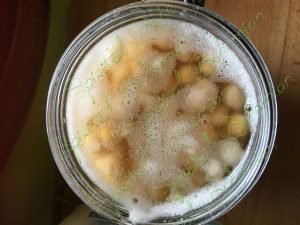
Have you ever wondered what goes on during fermentation and the role of microorganisms in this process? In this article I will try to explain the basic principles without getting too sciencey!
Fermenting is the ancient way of preserving food, but as it turns out, is really important for our gut health too. Humanity has been fermenting food since the Neolithic age, long before people understood the science behind the process. Today, following the scientific discoveries of French microbiologist Louis Pasteur, who showed that living organisms initiate fermentation, we now know why fermentation not only makes food like sourdough bread, cheese, and wine taste better, but also helps to keep us alive.
You are probably already acquainted with fermented foods as the process is still in use today to make foods such as beer, wine, cheese, yogurt. kombucha, soy sauce and Worcestershire Sauce!
How does fermentation work?
Fermenting is putting food into an acidic, anaerobic environment which encourages the natural bacteria and yeasts, that are already on and in food, to proliferate.
Sugars and starches are broken down by enzymes of microorganisms in the absence of oxygen, into alcohols and acids, making food more nutritious and preserving it, so it can be stored for longer periods of time without it spoiling . The word “ferment” comes from the Latin verb “fervere,” which means “to boil.” When you have a good ferment, it looks just like the liquid is boiling. This process effectively “pickles” the food by lowering the PH (making an acid environment), and gives food it’s distinctive “tangy” flavor. This also prevents the growth of harmful bacteria.
Micro organisms such as bacteria and fungi have unique sets of metabolic genes, allowing them to produce enzymes to break down distinct types of sugar metabolites. During fermentation, a variety of microorganisms are present in different proportions. Therefore, when the types and numbers of microorganisms are changed, the taste of fermented food can also change dramatically.
What are the Benefits of fermentation?
Why are fermented foods beneficial for us? Fermented products provide enzymes necessary for digestion. Humans are born with a finite number of enzymes, and they decrease with age so by eating fermented foods, we are provided with enzymes which help break down food and access nutrients.
Fermentation also aids in pre-digestion because the microbes feed on sugars and starches during fermentation, which breaks down the food before we eat it, making it easier for us to digest. This makes the nutrients more bio-available.
Grains, nuts, seeds, and legumes contain phytic acid, which is classed as an anti-nutrient. This is a natural part of food which has evolved to protect the “seed” from germinating under the wrong conditions. However this also blocks the human body from absorbing the nutrients contained in that food. Fermentation helps neutralize these anti-nutrients . Phytates also make starches, proteins, and fats less digestible, so neutralizing them is extremely beneficial.
Pro-biotics are a by product of the fermentation process and are living micro-organisms that help populate our gut and keep the balance of our microbiome healthy.
Fermentation makes vitamins and minerals more bio available to aid their absorption. Fermentation increases B and C vitamins and enhances folic acid, riboflavin, niacin, thiamin, and biotin. Concurrently, the probiotics, enzymes, and lactic acid in fermented foods facilitate the absorption of these vitamins and minerals by our bodies.
So fermentation is an excellent way to keep us healthy and store food without the use of refrigeration. This is particularly helpful when we have a glut of produce from the vegetable garden and no room left in the freezer! A win win all round. Here is just a small list of some well known fermented foods:
Common Fermented Foods
- Kefir
- Sauerkraut
- Tempeh
- Natto
- Cheese
- Kombucha
- Miso
- Kimchi
- Salami
- Yogurt
- Sourdough bread
- Beer
- Wine
- Olives
Why one is your favourite?
